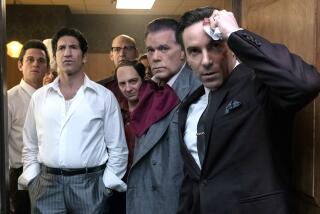WORKING THROUGH MAZE OF STEREO TV
- Share via
Notice anything new about the NBC peacock lately? More and more often, he’s seen wearing headphones. No, our feathered friend hasn’t bought a Walkman--he’s just letting you know when a program is being broadcast in stereo.
Still in its infancy but gaining ground quickly, broadcast-stereo is the biggest revolution in television transmission in 30 years--since the peacock landed with color.
Thanks to a system called MTS, you can now hear the bullets buzzing from right to left on “Miami Vice,” listen to more highfalutin’ room-crossing sounds on many PBS shows, and enjoy the small but slowly increasing amount of stereo transmissions on ABC, CBS and other TV outlets, including KTLA Channel 5.
MTS? Haven’t heard those initials yet? TV salesmen certainly have. Standing for multichannel television sound, MTS has been one of the hottest new terms in the alphabet-crazy electronics world ever since 1984, when it was finally approved by the Federal Communications Commission.
Last year, MTS decoders were built into 17% of color sets manufactured in or imported to the United States (3 million TVs), according to Television Digest, an industry publication. The percentage is expected to jump to 28% (5.1 million) in 1987. In addition, many of the newer, more expensive VCRs come equipped with a built-in MTS adapter.
Though there are some small advantages to having MTS decoding in both your TV and VCR, you should invest in both only if you’ve just won the lottery.
(A consumer note: Most MTS-equipped VCRs are also hi-fi machines. But some new decks have stereo sound and MTS but not hi-fi. Though these models cost less than hi-fi VCRs, they should be avoided--the stereo sound is a “linear” type that’s inferior to hi-fi stereo. Also, remember that “stereo-ready” or “stereo-capable” is not the same thing as stereo-decoding; make sure an MTS decoder is built in.)
However, don’t run out and buy an expensive MTS-equipped TV or VCR (a decoder adds about $100 to the price of either) until you’ve checked to see. . . .
If your local network affiliate passes on the network’s stereo signal (as, for example, KNBC-TV Channel 4 in Los Angeles does). Installation of the equipment costs stations between $50,000 and $300,000--so not every community is able to enjoy MTS.
Or , if you subscribe to cable, whether your cable system delivers MTS signals.
In other words, the first thing to do when considering the purchase of an MTS TV or VCR is to call your cable company and local network affiliates to see if they telecast the audio in stereo.
There’s something else to think about before making your purchase: What are you going to hear the sound through ? Fortunately, most MTS-equipped TV sets come with a built-in (if comparatively weak) amplifier and stereo speakers. However, if you’re buying one that doesn’t, or if you’re getting MTS decoding in a new VCR, then you’ll have to hook up the TV or VCR to your hi-fi system.
Be sure to consider all the things this involves--particularly if your TV, VCR and hi-fi system are going to be located in the same room (and, to avoid trails of wires, in the same corner of the room).
There’s another alternative to buying an MTS-equipped TV or VCR--and that’s to add an MTS decoder to your current television. If you have a “stereo-ready” set, you may be able to plug in a decoder easily, but there’s a catch: The decoder often won’t work properly if it isn’t the one specifically made for your model, and finding the right device might be difficult.
The good news is that several companies make decoders that work on most TVs--even those that aren’t “stereo-ready.” These range from $150 up, and the most popular is called FRED (for Friendly Recoton Entertainment Decoder). In fact, Recoton brings out ever-improved “sequels” to its original decoding gadget; the latest has been dubbed FRED III.
OK, let’s pretend everything’s set up for your first TV-stereo experience. What will you actually hear?
It will vary from program to program, says Perry Massey, vice president of program production at NBC. “The stereo on filmed shows (like ‘Miami Vice’ or ‘L.A. Law’) is generally added in post-production,” Massey said. “The music and sound effects will usually be in stereo,” but only on some situation comedies are actors actually miked separately to take full advantage of it.
A skeptic once said that stereo won’t make the jokes on “The David Letterman Show” any funnier. Maybe not, but Massey points out that while Letterman is heard in the center of the sound spectrum, the show’s music and even the audience response are in stereo.
NBC broadcasts an average of 61 hours of stereo a week. In sharp contrast, ABC has only one regular program in the format (the half-hour “Sledge Hammer!”) and CBS none. However, all three networks come through in multichannel sound on certain specials, movies and sports events. CBS made its MTS debut with last year’s Grammys. This year the music-awards show will again be in stereo, as was the Super Bowl.
MTS has other advantages. Its noise-reduction quality is even better than that of FM stereo. (And by the way, HBO, MTV and some other cable channels still broadcast their stereo programming in a format that can be heard only if a special hookup to your hi-fi system has been made by your local cable operator, which may charge for the installation.) And MTS actually has three channels--the third one can be used for broadcasting an extra signal, such as Spanish-language audio.
But CBS is still showing caution about adding MTS to its programs. “Our figures show there’s still only about a 5% penetration in sets equipped with stereo decoding,” said CBS spokeswoman Pamela Haslam. “Traditionally, the takeoff point for any new technology is around 20%. We’ll be watching the (MTS) growth closely, but it still has a way to go.”
At NBC, Massey countered that broadcast-stereo will be “just like color. It makes a very obvious difference.” Will the competitors come around to NBC’s viewpoint in ‘87? “I can’t speak for them,” chuckled Massey, “but I suspect they will.”


